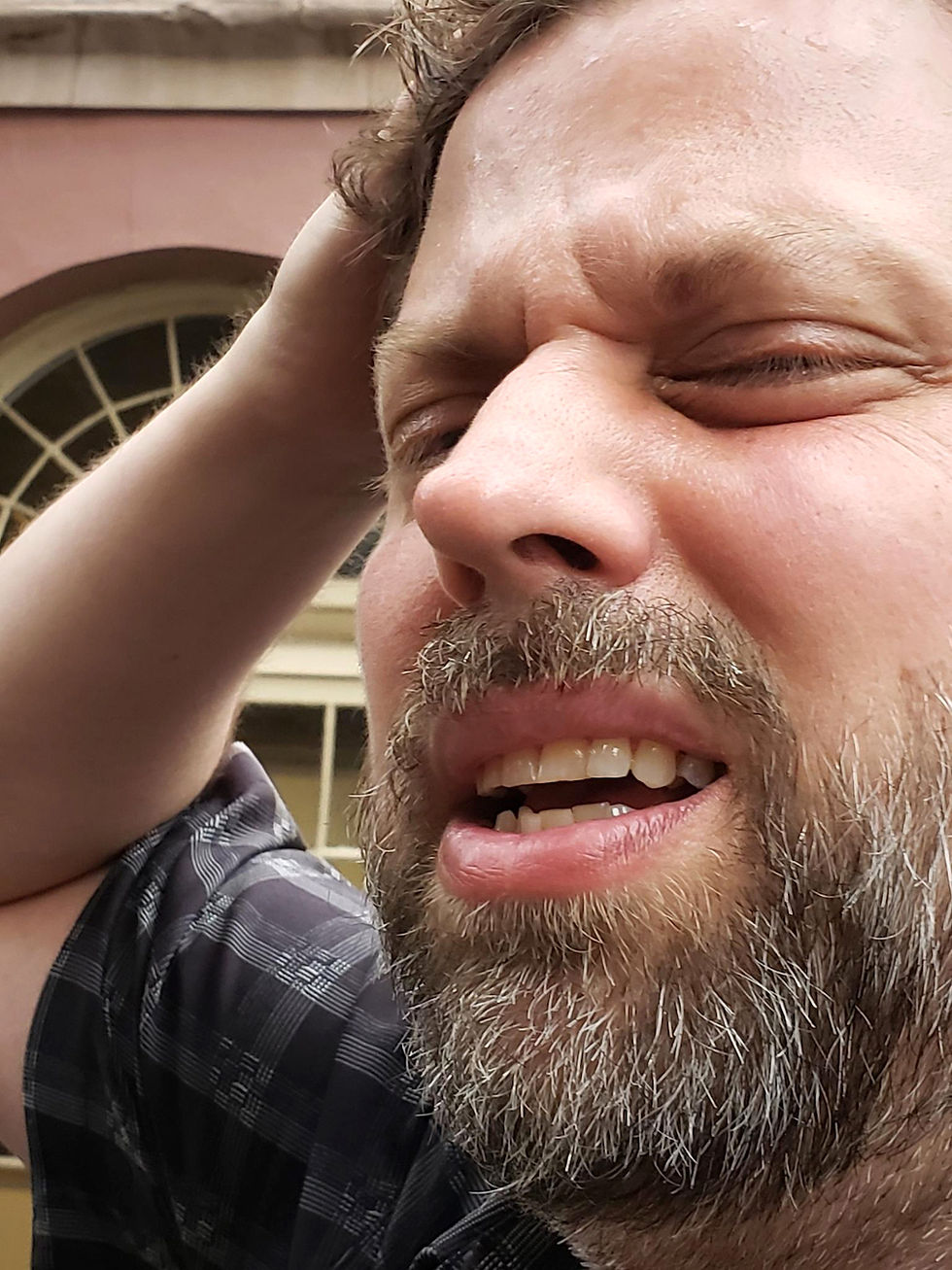The 7Q Interview: Sawney Hatton
- Oct 8, 2019
- 4 min read
AUTHOR BIO
Sawney Hatton is an author, editor, and screenwriter. His published credits include the Dark Comedy novel Dead Size, the YA Noir novella Uglyville, and the Dark Fiction short story collection Everyone Is a Moon. He also edited the Sci-Fi Horror anthology What Has Two Heads, Ten Eyes, and Terrifying Table Manners? Other incarnations of Sawney have produced marketing videos, attended all-night film festivals, and played the banjo and sousaphone (not at the same time). As of this writing, he is still very much alive. You can become better acquainted with him at www.SawneyHatton.com.
QUESTIONS
#1. Looking back, what’s one fiction book that you feel truly made an impact on your writing? Do you still gravitate towards that author?
#1. Answer: Looking back—way back, like high school days—there were actually two books that blew my nascent authorly mind: Stephen King’s Pet Sematary, which showed me how dark storytelling can get, and William S. Burroughs’s Naked Lunch, which showed me how fucked up storytelling can get. To be honest, I haven’t read (or re-read) any books by either author in years, which is something I really should remedy, if only to see if their writing has the same impact on me today.
#2. How do you feel about the use of sub-genres in the industry? How do you describe your work overall?
#2. Answer: I love sub-genres! One day I aim to create one of my own. Right now, I describe my work broadly as Dark Fiction, ranging from Dark Comedy, to Crime Thriller, to Horror of all stripes (psychological horror, supernatural horror, body horror, etc.). I pitch my debut novel Dead Size to others as a “darkly comedic psychological fantasy mystery thriller,” a sub-genre I hope catches on.
#3. What about your writing process do you think is unique or quirky? What’s the worst writing advice you’ve ever received?
#3. Answer: I generally only write stories after I have allowed them to incubate in my brain for a while, a minimum of a few months, sometimes even years. I need to write stories that I feel not only enduringly passionate about, but that I believe haven’t been told before (at least not the way I want to tell it). If I think my idea shares even a germ of another story, I’ll often kill it unless I can find a satisfactorily original angle. Those ideas that make the cut I’ll begin outlining, sometimes in screenplay form.
Outlining is crucial to my process, which is why the worst writing advice I ever received was that I should eschew outlining entirely, ostensibly so I would not lose interest in writing the book. (Hmmm... I wonder what’s gonna happen next. Guess I’ll have to wait until I write it!) But if I don’t know where I’m going from the point of departure, there’s a higher probability I’ll never arrive to my destination. I write for that perfect ending I already know I’m headed for.
(Note: My wife thinks the quirkiest aspect of my writing process is how I recite dialogue I’m developing aloud while I’m in the bathroom. This doesn’t seem at all strange to me, and I like to believe other authors do this as well. Bathrooms are terrific places to puzzle out all kinds of narrative elements.)
#4. How does music and media factor into your writing? Do you feel it plays as much an inspirational role as literature?
#4. Answer: I love both music and movies, and their influence on my writing cannot be overstated. Music feeds my moods, and I often listen to different types of songs if I want to generate a particular atmosphere in my mind that gets transferred to my writing.
As for movies, filmmaking was my first love, so I had embraced the craft of screenwriting, studying effective 3-act plotting and trying to emulate it in my own work. This cinematic perspective has definitely found its way into my prose; in fact, many of my stories were adapted from my original scripts.
#5. As an author, how much do you engage in social media? Do you feel it is more for your own entertainment, or for marketing and networking?
#5. Answer: Social media is definitely useful for marketing and networking, though I am pretty piss poor at using it as such. In using it as a brain-basting time-sucker, however, I think I have earned some sort of professional credential, maybe even an advanced degree.
#6. Where do you see the future of horror fiction heading? In turn, what changes would you love to see, either socially or technologically?
#6. Answer: For me, the best horror has always been about more than just entertainment. Sure, providing a compelling narrative that delivers chills and thrills is great, but I really relish those horror stories with subtext, presenting themes that mirror the real horrors of our world. The best horror is the most impactful, lingering long after the person is done consuming it because it hits them beyond the visceral experience; it makes them confront reality, which can be infinitely scarier than anything conceived by the imagination. In the future, I hope more horror authors (and filmmakers) take advantage of the form to offer nuanced commentaries on those real-life issues that affect them, in turn affecting us.
#7. What can you tell us about any forthcoming projects? What titles would you like to promote now?
#7. Answer: My latest novella, “The Devil’s Delinquents,” appears in the newly-released Murder in Montague Falls(www.amazon.com/gp/product/B07X5GLPGD), a Noir-inspired anthology that also features suspense stories by Russ Colchamiro and Patrick Thomas. Mine is perhaps—probably—the darkest of the trio, chronicling the misadventures of three devil-worshipping teens. A few months ago I also published my Dark Fiction short story collection Everyone Is a Moon (www.amazon.com/gp/product/B07DT4B9YM), which I feel contains some the best (or at least ballsiest) work I have ever written.
AUTHOR PHOTO

Comments